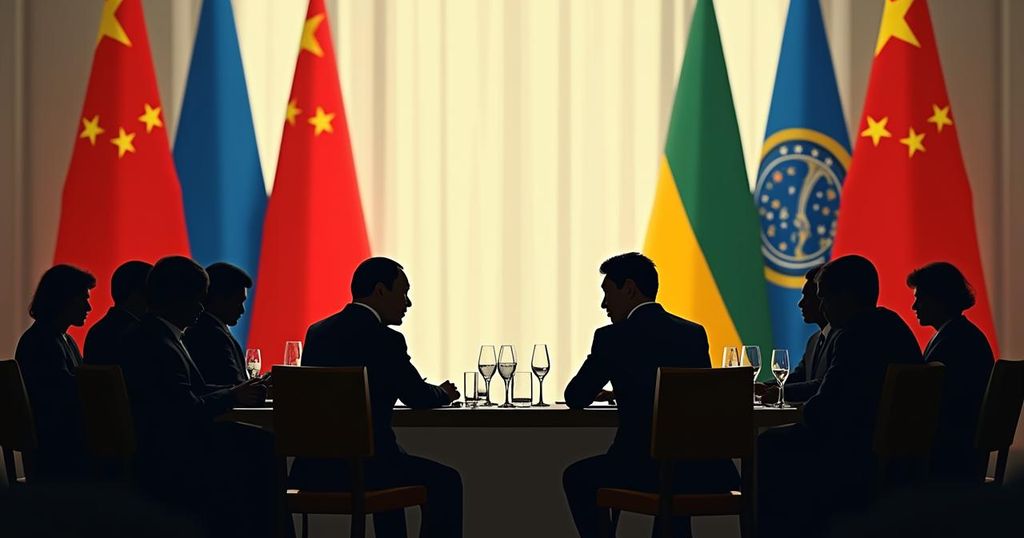China and Brazil are attempting to garner support for a peace plan to resolve the Ukraine conflict amidst Ukrainian President Zelenskyy’s criticism. Concerns are raised over China’s support for Russia, and tensions heighten with North Korea’s reported arms supply to Russia. Diplomatic discussions continue, including a significant meeting between Trump and Zelenskyy, while military actions persist in Ukraine and Finland enhances NATO defenses near Russia.
China and Brazil are actively promoting a peace plan aimed at resolving the ongoing conflict in Ukraine, despite strong opposition from Ukrainian President Volodymyr Zelenskyy, who views the initiative as potentially beneficial to Moscow. During a meeting held on the sidelines of the UN General Assembly, which included representatives from seventeen nations, Chinese Foreign Minister Wang Yi and Brazilian Foreign Policy Adviser Celso Amorim emphasized the importance of preventing escalation, avoiding the use of weapons of mass destruction, and protecting nuclear facilities. In addressing the assembly, President Zelenskyy criticized the proposals from China and Brazil, claiming they could provide Moscow with the political latitude necessary to extend the conflict. Meanwhile, U.S. Secretary of State Antony Blinken expressed concerns regarding China’s affiliations with Russia and warned that Chinese companies were inadvertently contributing to Russia’s military objectives. The situation is further complicated by allegations that North Korea is supplying arms to Russia, as stated by South Korea’s Foreign Minister. In a notable diplomatic engagement, former U.S. President Donald Trump met with President Zelenskyy, indicating a willingness to mediate if he were to be elected again, though concerns over the impact of his presidency on U.S. military aid to Ukraine persist. In parallel, Finland is strengthening its NATO presence near the Russian border, while reports indicate ongoing military actions in Ukraine’s Donetsk region, including Russia’s claimed capture of the village of Marynivka, despite assertions from Ukraine’s military refuting such claims. The Russian government has initiated legal inquiries into foreign journalists and has garnered attention for its aggressive military operations, which culminated in recent missile strikes in Ukraine, resulting in civilian casualties. Additionally, some Ukrainian children deported to Russia have been repatriated, facilitated by Qatari intermediaries, amid ongoing debates over humanitarian issues arising from the conflict.
The conflict between Ukraine and Russia, which escalated significantly following Russia’s invasion in February 2022, has drawn international scrutiny and numerous diplomatic efforts to resolve the crisis. China and Brazil, two influential developing countries, are attempting to rally support for their peace plan during the UN General Assembly, but their initiatives face challenges due to the skepticism expressed by Ukraine. Zelenskyy’s strong stance against perceived compromises that could empower Moscow is indicative of his administration’s commitment to maintaining territorial integrity and sovereignty. Concurrently, the tensions between U.S. diplomacy and China’s perceived alignment with Russia underscore the complexities of international relations amidst ongoing warfare. The current geopolitical climate is marked by heightened military posturing, allegations of arms trafficking, and the humanitarian repercussions of the conflict, including the treatment of displaced children.
In conclusion, the diplomatic landscape surrounding the Ukraine conflict remains intricate, with China and Brazil promoting their peace plan despite Ukrainian resistance. The situation is further complicated by U.S. apprehensions regarding China’s involvement with Russia, ongoing military exchanges between Russia and North Korea, and recent developments within Ukraine itself. The continued support for Ukraine’s sovereignty is evident through Zelenskyy’s engagements with world leaders and military strategies, showcasing the international community’s divided yet vigilant approach to the conflict. As nations navigate these challenges, the urgency for a sustainable resolution becomes increasingly critical.
Original Source: www.theguardian.com







